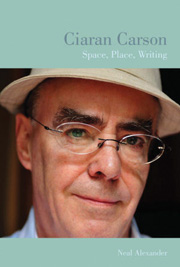Book contents
- Frontmatter
- Contents
- Acknowledgements
- Abbreviations
- Introduction
- Chapter 1 Imaginative Geographies: The Politics and Poetics of Space
- Chapter 2 Mapping Belfast: Urban Cartographies
- Chapter 3 Deviations from the Known Route: Reading, Writing, Walking
- Chapter 4 Revised Versions: Place and Memory
- Chapter 5 Spatial Stories: Narrative and Representation
- Chapter 6 Babel-babble: Language and Translation
- Bibliography
- General Index
- Index of Works
Chapter 4 - Revised Versions: Place and Memory
- Frontmatter
- Contents
- Acknowledgements
- Abbreviations
- Introduction
- Chapter 1 Imaginative Geographies: The Politics and Poetics of Space
- Chapter 2 Mapping Belfast: Urban Cartographies
- Chapter 3 Deviations from the Known Route: Reading, Writing, Walking
- Chapter 4 Revised Versions: Place and Memory
- Chapter 5 Spatial Stories: Narrative and Representation
- Chapter 6 Babel-babble: Language and Translation
- Bibliography
- General Index
- Index of Works
Summary
The importance and complexity of memory in Carson's aesthetic is apparent when, as in ‘Ambition’, time is conceived as a road that rarely runs straight, its course marked by manifold obstructions and convolutions. After all, the action of taking one step forward, two steps back can be understood in temporal as well as spatial terms, and in Carson's writing the past typically manifests itself as ‘a trail of moments/ Dislocated, then located’ (IFN, 58) that precludes a commanding overview. This much is clear in the opening lines of ‘Ambition’, where the narrator and his father have climbed Black Mountain in order to survey Belfast's cityscape from an elevated vantage-point: ‘Now I've climbed this far, it's time to look back. But smoke obscures/ The panorama from the Mountain Loney spring.’ That the poem should begin with an act of ‘looking back’ invites a reading in metaphorical terms, for during the ascent the two men have been ‘smoking “coffin nails”’ and the speaker's father has been recalling ‘his time inside’. Mistaken for his brother, he had been interned without trial for seven weeks in August 1971, an experience that ghosts the whole of the narrative and is the source of a series of quips and asides, adages and practical knowledge – ‘seven cigarette ends made a cigarette’ – but is only ever relayed indirectly and in a deliberately fragmented or ‘dislocated’ form. As the narrator wryly observes at one point, ‘my father's wandered off somewhere. I can't seem to find him’ (BC, 27).
- Type
- Chapter
- Information
- Ciaran CarsonSpace, Place, Writing, pp. 112 - 142Publisher: Liverpool University PressPrint publication year: 2010

